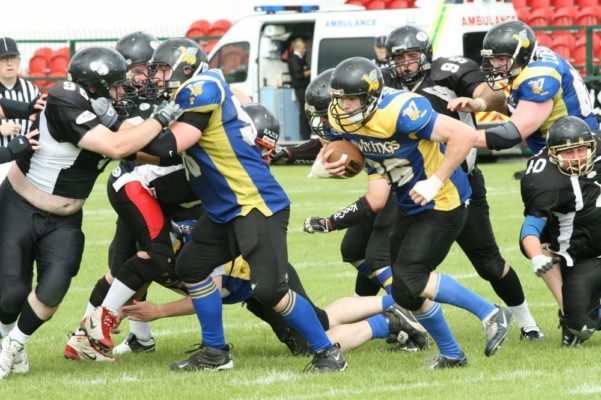After suffering every player’s nightmare, a torn anterior cruciate ligament, or ACL, Ireland’s Adrian Garvey relates his tough road to recovery.
‘I still had a strong love for the game’.
Injuries are a frequent occurrence in all aspects of sport; particularly those of a physical and violent nature. Within contact sports, the fear of injury is a constant threat but yet in most cases, it remains unavoidable. Minor injuries can lead to several weeks on the sideline, others are much tougher to overcome.
University of Limerick Vikings star player Adrian Garvey suffered a gruesome injury in 2015 when he went down during a home game with the North Kildare Reapers. After initial reports suggested nothing more than a sprained knee; the test results delivered worse news than expected. Garvey had ruptured his ACL ligament, had tears on both meniscus and suffered stress fractures on his tibia.
After a strong start to the campaign, the veteran running back was in scintillating form scoring four touchdowns in the opening three games of the 2015 season, so I’m sure it was a difficult moment to realise that his season would be cut short. This would be Garvey’s first serious injury after nearly 10 years in the top Irish league, the IAFL. Ahead of this weekend’s game with Trinity College, Adrian took the time to chat about his experience.
Although the surgery was successful, the long road to recovery was only beginning. The initial weeks were troublesome and frustrating and for someone who put plenty of effort on to the field, having to resist training was a consistent struggle.
“Trying not to push too hard too early and let the injury heal was challenging. For someone who likes to be active in sport, I found the initial phase mentally draining. Being isolated to a couple of rooms in your house is something I wouldn’t want to experience again.”
Being inactive from a sport that you love can take its toll on anybody. It’s not only a physical battle to get back into shape; it tests your resolve and mental toughness. Surrounding yourself with the right people can often help you overcome the darker times, and that was the case for Adrian as he explained.
“It has been a long road to recovery and I owe a lot of thanks to Ciaran O’Sullivan (Irish team coach) for helping with my rehab as well as my physio Colin Lane for kicking me in the ‘arsenal’ when needed. As of now I’m itching to get back onto the field. It has been almost a year of not playing competitive football, watching from the sidelines. So the desire to be out there is quiet high.”
A year can be a long time in a career of an athlete, particularly if you are unable to compete alongside your teammates. Despite not being ready to take part in contact football, Adrian kept himself involved with the game by becoming heavily integrated into the coaching set up with the Irish U 20’s side.
‘Something that I find great reward from is the U20’s squad. I initially started as the running backs coach and due to the departure of Eoin O’Sullivan, a very talented coach to ply his skills in European Football, I was elevated to offensive coordinator. Football is something I enjoy a lot and if I can be involved in anyway possible, I will.’
Back on the field
This Sunday will see Garvey put on the blue of the Vikings for the first time in over a year as they go head-to-head with fierce rivals Trinity College. Despite being primarily known for his elusive skills in the backfield, he will be starting the season lining up on the other side of the ball, albeit in a familiar role at inside linebacker where he started his career. Although he does hope to resume duties at running back later in the year, his sole focus over the coming days is preparing himself for his first competitive game back.
‘For me I’m feeling excited. First game back and looking to put in a good performance. One interesting thing I look forward to is playing against Trinity running back Ola [Bademosi]. I’ve been coaching him now with the U20’s squad so this would be a good test to see if he has picked up what I’ve been teaching him’.
Setting goals during a long recovery process is paramount to staying motivated. The long-term aim may always be to return to the field but staying patient and vigilant in your approach is important. For Garvey, the long wait is almost over and with his sights firmly set, he can now start working towards making his mark in the IAFL once again.
‘One of the main motivators for me was the Irish team. I didn’t want to miss out on an opportunity to represent at an international level. Another motivator was the rumours that generally circulate from people in sport that say he will never be the same player. I found great motivation in these statements to prove them wrong.’
There are many highs and lows involved with sport and injuries are certainly one of the lower moments. As is the case with contact sports like American Football, setbacks are inevitable but it’s being able to overcome those obstacles and battle your way through that make it all worthwhile. So long as your passion remains, then the end goal won’t be out of reach.
‘I guess motivation comes from all areas. Once I got back to being able to train I have found that I still had a strong love for the game. Thankfully, I never lost that.’

